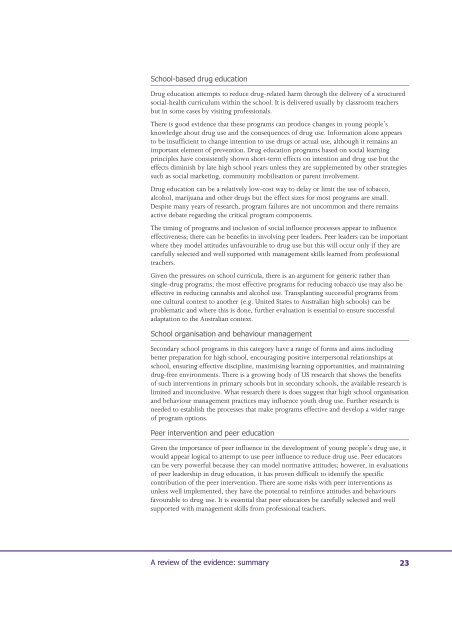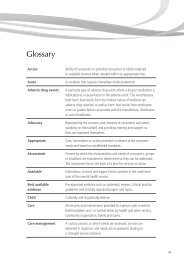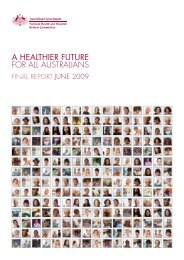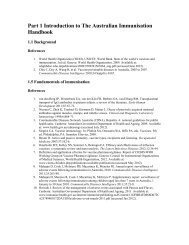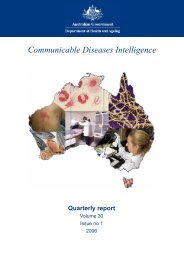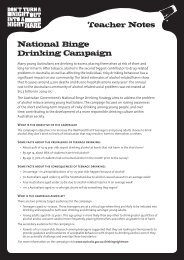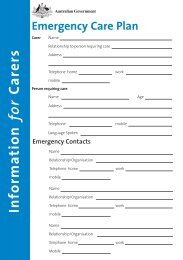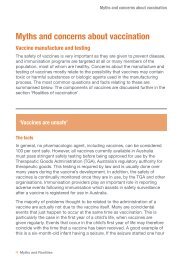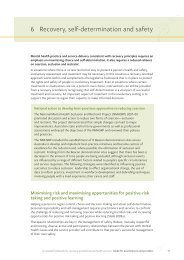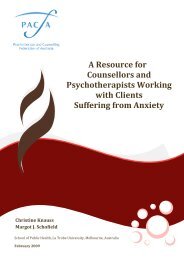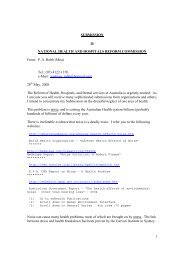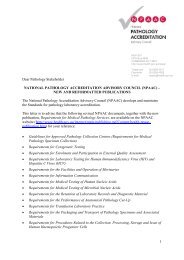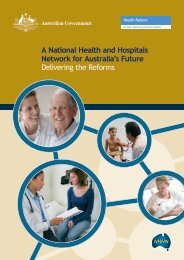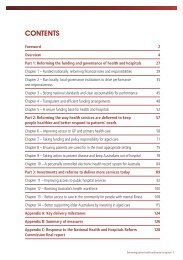Summary - Department of Health and Ageing
Summary - Department of Health and Ageing
Summary - Department of Health and Ageing
You also want an ePaper? Increase the reach of your titles
YUMPU automatically turns print PDFs into web optimized ePapers that Google loves.
Drug education attempts to reduce drug-related harm through the delivery <strong>of</strong> a structured<br />
social-health curriculum within the school. It is delivered usually by classroom teachers<br />
but in some cases by visiting pr<strong>of</strong>essionals.<br />
There is good evidence that these programs can produce changes in young people’s<br />
knowledge about drug use <strong>and</strong> the consequences <strong>of</strong> drug use. Information alone appears<br />
to be insufficient to change intention to use drugs or actual use, although it remains an<br />
important element <strong>of</strong> prevention. Drug education programs based on social learning<br />
principles have consistently shown short-term effects on intention <strong>and</strong> drug use but the<br />
effects diminish by late high school years unless they are supplemented by other strategies<br />
such as social marketing, community mobilisation or parent involvement.<br />
Drug education can be a relatively low-cost way to delay or limit the use <strong>of</strong> tobacco,<br />
alcohol, marijuana <strong>and</strong> other drugs but the effect sizes for most programs are small.<br />
Despite many years <strong>of</strong> research, program failures are not uncommon <strong>and</strong> there remains<br />
active debate regarding the critical program components.<br />
The timing <strong>of</strong> programs <strong>and</strong> inclusion <strong>of</strong> social influence processes appear to influence<br />
effectiveness; there can be benefits in involving peer leaders. Peer leaders can be important<br />
where they model attitudes unfavourable to drug use but this will occur only if they are<br />
carefully selected <strong>and</strong> well supported with management skills learned from pr<strong>of</strong>essional<br />
teachers.<br />
Given the pressures on school curricula, there is an argument for generic rather than<br />
single-drug programs; the most effective programs for reducing tobacco use may also be<br />
effective in reducing cannabis <strong>and</strong> alcohol use. Transplanting successful programs from<br />
one cultural context to another (e.g. United States to Australian high schools) can be<br />
problematic <strong>and</strong> where this is done, further evaluation is essential to ensure successful<br />
adaptation to the Australian context.<br />
<br />
Secondary school programs in this category have a range <strong>of</strong> forms <strong>and</strong> aims including<br />
better preparation for high school, encouraging positive interpersonal relationships at<br />
school, ensuring effective discipline, maximising learning opportunities, <strong>and</strong> maintaining<br />
drug-free environments. There is a growing body <strong>of</strong> US research that shows the benefits<br />
<strong>of</strong> such interventions in primary schools but in secondary schools, the available research is<br />
limited <strong>and</strong> inconclusive. What research there is does suggest that high school organisation<br />
<strong>and</strong> behaviour management practices may influence youth drug use. Further research is<br />
needed to establish the processes that make programs effective <strong>and</strong> develop a wider range<br />
<strong>of</strong> program options.<br />
<br />
Given the importance <strong>of</strong> peer influence in the development <strong>of</strong> young people’s drug use, it<br />
would appear logical to attempt to use peer influence to reduce drug use. Peer educators<br />
can be very powerful because they can model normative attitudes; however, in evaluations<br />
<strong>of</strong> peer leadership in drug education, it has proven difficult to identify the specific<br />
contribution <strong>of</strong> the peer intervention. There are some risks with peer interventions as<br />
unless well implemented, they have the potential to reinforce attitudes <strong>and</strong> behaviours<br />
favourable to drug use. It is essential that peer educators be carefully selected <strong>and</strong> well<br />
supported with management skills from pr<strong>of</strong>essional teachers.


